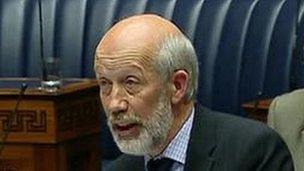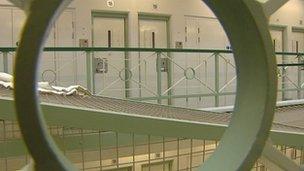David Ford denies prison authorities reneged on deal
- Published

Mr Ford said the Prison Service was seeking alternatives
The Justice Minister, David Ford, has repeated his call for an end to the so-called 'dirty protest' by dissident republican prisoners in Maghaberry jail.
More than 20 inmates have been smearing excrement on walls and floors for the past 10 months.
The prisoners say they want scanning devices to replace body searches.
Mr Ford said the Prison Service was seeking alternatives.
Prison protests have been an important part of the history of violent republicanism.
There have been hunger strikes and dirty protests and the murders of prison officers as republicans sought to exercise control over the way they were imprisoned.
While the tactics have varied, the aim was the same.
Republicans insisted they were special category, political prisoners, while the government and their opponents said they were simply criminals who should be treated as such.
The early release of hundreds of republican and loyalist prisoners after the signing of the Good Friday Agreement ended decades of disputes and segregated wings, when paramilitary organisations effectively ran the high security Maze prison outside Lisburn.
The prison authorities vowed that such a regime would never be allowed to occur again.

Twenty-seven inmates are protesting at Maghaberry Prison
But there is still segregation in the high security Maghaberry prison, with loyalists and republicans held in their own blocks. Protest has also returned.
There are currently 27 prisoners from the various dissident republican groups in Roe House who are on what is full or partial dirty protest.
Some mix their excrement and urine and smear it on their cell walls, while others mix it and throw it out under their doors and on to the landings.
The reasons is a dispute over what the prisoners call strip searching, and the prison authorities refer to as full body searches.
Mr Ford pointed out that these searches are part and parcel of life in all prisons throughout the United Kingdom, and said they are vital for security. The prisoners said the rationale was humiliation, not enhanced security.
The current protest goes back to May last year.
The prisoners said it started because the prison authorities reneged on an agreement they signed in August 2010 after months of discussions with mediators.
The prisoners insist the agreement was to end the policy of routine full body searches.
They agreed to be scanned by a BOSS chair - Body Orifice Security Scanner - and to be strip searched if it indicated that they were concealing an item, or if intelligence information suggested they were.
"They accepted that full body searches could be used in exceptional circumstances, it was not a total rejection," said a source.
"But their understanding was that such searches would no longer be routine either for movement inside the prison or when leaving and entering their blocks for visits and court appearances."
Damien McLaughlin, a 35-year-old from County Tyrone, was released from Roe House recently after serving just over two years for possession of two rifles, a sawn off shotgun and more than 100 bullets.
"The August 2010 agreement has to be implemented in full," he told the BBC. "We signed up to it in good faith. All routine strip searches were to cease, but the prison reneged on this."
David Ford robustly rejected that claim.
"That is simply not correct," he said.
"It removed the need for full body searching for movements within the prison, it did not make any change at all to the movement entering and leaving the prison, those arrangements are the same for every prisoner in Magahberry, every prisoner in Magilligan, and every prisoner in prisons across the United Kingdom."
Mediators involved in brokering the agreement believed it offered a solution to the protest, and that if the spirit of the agreement had been entered into, the current situation within Roe House would not exist.
Mr Ford rejected any suggestion that the prison authorities had broken the spirit of the agreement.
"The spirit of the agreement has been breached by those prisoners who have not adhered to the agreement, who have made threats to prison officers, who have seen those threats posted on websites.
"But the spirit of the agreement has been adhered to by the prison service and by the department of justice."
Last year an independent review team headed by Dame Ann Owers said the prison service should seek alternatives to full body searches.
In recent weeks, Mr Ford has visited Portlaoise and Birmingham prisons, and a detailed report is being prepared examining what technology is available.
The minister said that showed good will and that the authorities were doing what the prison review team asked them to do.
"There is no justification for the protest," he added. "The prison service and the department of justice are living up to the recommendations of the report and we are seeking alternative technologies."
The prisoners disagree and insist that the BOSS chair system is the answer. They said the protest would go on until the policy of routine body searches ended.
The prison authorities insisted the BOSS chair was not the answer and that routine full body searches would only end if they find a secure alternative.
- Published8 March 2012
- Published8 March 2012
- Published22 February 2012
- Published29 January 2012
- Published24 November 2011
- Published29 June 2011